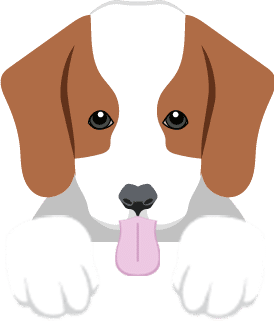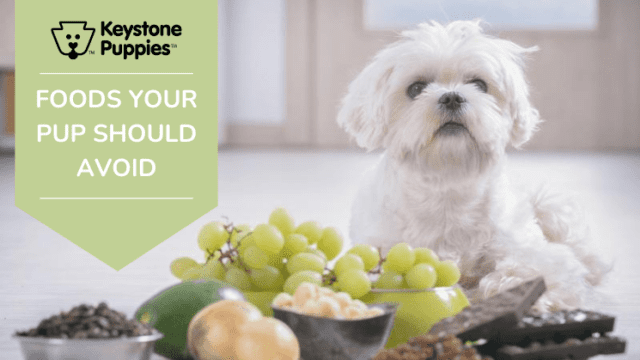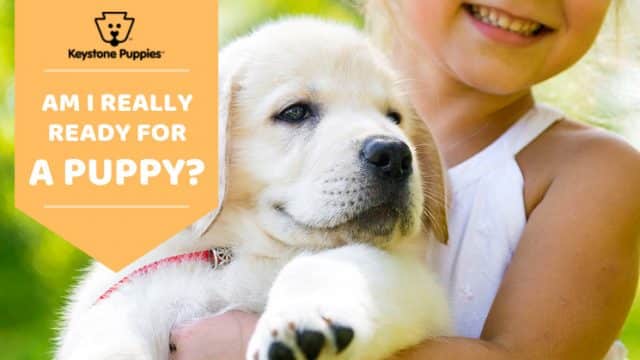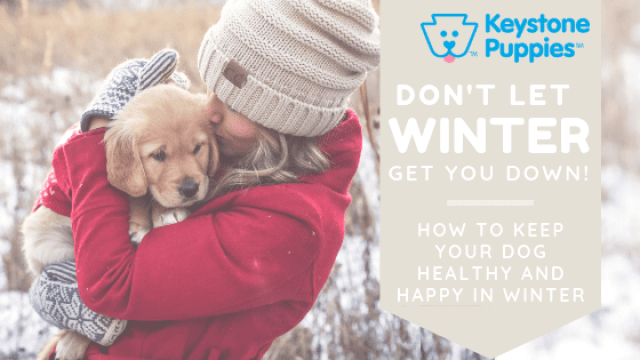Which People Foods are Okay for Dogs?
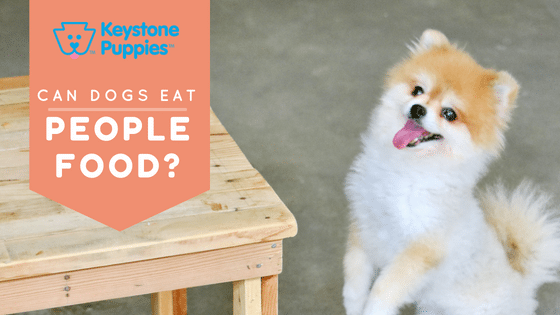
Since the earliest days of dog domestication, canines have been begging for human food. And for thousands of years, humans have been sharing our scraps with the dogs around us. Even young children instinctively want to feed a begging pup. However, not all human food is safe for your dog. And too many table scraps can contribute to a weight problem for your pet. How do you know which foods are okay for your dog to eat?
Kibble is Best for Your Pup
Before we dig into which human foods you can feed your dog, keep in mind that the best food for your puppy is kibble, formulated for your dog’s size and health. Table scraps or human food should make up less than 10% of your dog’s daily intake. The right kibble provides all the protein and nutrients your puppy needs to stay healthier, longer. (For more information, see our blog on the best ways to feed small dogs, and the best way to feed large dogs.)
Limit Your Puppy’s Snacks
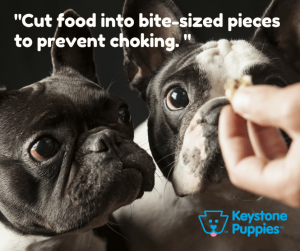
Even if a food is safe for your dog to eat, offer snacks in moderation. Not only should you limit the volume of human food you share with your pup, but you should also cut your treats into small pieces to make it safer to chew and easier to digest.
If you have any questions about the types of foods you can offer your dog, how much you should be giving him, or how small you should chop the food before serving, consult with your vet.
Which Foods can Dogs eat?
Many human foods are safe for most dogs. However, a small number of dogs will have unexpected allergies to foods. Play it safe, and start by trying out a little tidbit of a new food. Then watch for stomach upset or diarrhea over the next day or so. If your dog does well with the snack, you can up the amount slightly next time. Remember that too much of any one human food may cause stomach upset or diarrhea, even if your dog eats it regularly. Limit amounts of any one food to just a few small bites a day.
Red, Green, Orange, and Yellow Bell Peppers: Safe for Pups
Red bell peppers are a nutritious snack for your canine pal, but green, yellow, and orange bell peppers are also good choices. The seeds and stems from the peppers may be hard for your dog to digest, so remove them before sharing bits of fresh or cooked bell peppers. While mild bell peppers are safe for your dog, hot peppers are not. Never give your pup any type of hot pepper.
Carrots: Good for Dogs
Whether cooked or raw, carrots are safe for your dog to eat. Carrots are low in calories and full of the vitamins and minerals that help dogs thrive. Cut carrots into bite-sized pieces to prevent choking.
Rice: Safe For Dogs
Not only can dogs eat plain, cooked brown or white rice, it’s also easy for them to digest. A bit of cooked rice can help relieve a dog’s upset stomach. Rice is so easy on your pup’s digestive system that meals of plain cooked rice with equal parts unseasoned cooked chicken are a common treatment for bouts of indigestion.
Cooked Eggs: Safe for Dogs
Giving your pup a bit of cooked egg is safe, but never give your dog raw or undercooked eggs. Try sprinkling a few bits of leftover scrambled eggs (unsalted) on your dog’s kibble as a special treat.
Cooked Salmon and Cooked Shrimp: Safe for Your Puppy
Cooked salmon and shrimp are safe and healthy foods for dogs. Make sure to debone any salmon you feed to your pup and make sure any shrimp you share with your pet is entirely free of shells or tails. Never give your dog raw salmon or raw shrimp, which could contain a parasite that can be dangerous.
Cooked Beef, Pork, Turkey, Chicken, and Lamb: Safe for Pups
Well-cooked meat is safe and nutritious for your canine pal. However, limit the grease, fat, or salt, since these can strain your pup’s system, even resulting in serious health issues. Never give your dog raw or rare meat which could contain dangerous bacteria. And while it may be tempting to load up your pup on animal protein, remember that the dog food you purchase is already full of meat and protein. It’s a good idea to limit meat snacks. And never give your dog meat bones. Resulting slivers or shards could be deadly.
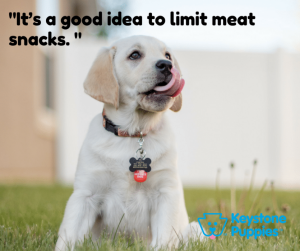
Corn and Sweet Potatoes: Safe for Your Dog
Dogs can eat corn and sweet potatoes in moderate amounts. They’re full of the vitamins and minerals dogs need. Maybe that’s why they’re such a common ingredient in dog food. Limit servings to one or two tablespoons a day, and don’t give your dog corn cobs or sweet potato peels.
Green Peas and Broccoli: Safe for Your Pup
Green peas and broccoli are low in calories and high in nutrients. Many dogs enjoy eating these green vegetables, making them a healthy treat. Feed your pup fresh or frozen peas and broccoli, without salt or sauces. Avoid canned or prepared versions, since they usually high levels of sodium.
Oatmeal: Safe for Your Dog
Some dogs enjoy plain oatmeal, and it’s safe to give your dog a few raw or cooked oats as a treat. However, don’t serve it with salt, sugar, or spices. Some spices can be dangerous to dogs, including cinnamon, so stick with plain oatmeal to keep your pup safe.
Peanut Butter: Safe for Most Dogs
Most dogs love peanut butter. Many pet owners know that covering a pill in peanut butter is a great way to get a pup to take medicine. You can also put a dab of it on a few pieces of kibble. Most dogs will be fine with peanut butter, but a small number of pets may have allergies, so start with just a bit and see how your puppy reacts before giving it to him again. Peanut butter is high in fat and calories, so limit the amount you give your pup. To keep the salt and sugar levels lower, try natural, unsalted peanut butter.
Cheese: Safe for Pups, With Some Exceptions
Cheese is safe for most dogs. However, some dogs may be lactose intolerant. Lactose intolerant pups may experience painful gas or diarrhea when consuming dairy products like cheese. Start with a small bit of cheese, and see how your dog reacts before sharing it with him again.
Popcorn: Safe for Dogs, but Watch the Salt and Oil
Popcorn is safe for dogs, but the salt and oil present in some types of popcorns isn’t good for dogs. If you want to give your pup popcorn as an occasional treat, stick to air-popped varieties, and don’t give dogs un-popped kernels, which may lodge in his teeth.
Blueberries, Blackberries, and Strawberries: Safe in Limited Amounts
These berries are safe for your pup, but share them in moderation. Too much fruit can be challenging for a dog’s digestive system, and result in uncomfortable gas or diarrhea.
Fresh Pineapple and Watermelon: In Moderation
Fresh pineapple and seedless watermelon are full of vitamins and minerals, and safe for you to share with your dog. However, some dogs don’t process fruit well and may experience uncomfortable gas or diarrhea. For that reason, limit your pup’s intake of these fruits to small amounts.
Bananas: In Moderation
Many dogs like bananas and this fruit can provide valuable vitamins and minerals. As with any fruit, feed it to your pup in moderation. Limit bananas to a few slices a day or your dog may experience indigestion or diarrhea.
Avoid Cashews, Almonds, and Peanuts, and NEVER Share Macadamia Nuts
While most nuts are not poisonous to dogs, they are hard to chew, present a choking hazard, are usually salted, and are high in calories. It’s better to keep nuts away from your pup. And never give your dog macadamia nuts. With a few hours of eating macadamia nuts, dogs experience serious side effects including tremors and losing the ability to walk. If your dog eats a macadamia nut, take him to the vet immediately.
Some Foods are Dangerous for Dogs
Many human foods are dangerous, even deadly, for dogs. Don’t let your dog eat foods that contain chocolate, caffeine, artificial sweeteners, citrus, avocados, yeast dough, onions, garlic, chives, nuts (especially macadamia nuts), grapes, raisins, coconut products, or raw eggs. If your dog has ingested any of these foods, consult your vet immediately.
Some dogs are lactose intolerant. That means they can’t eat milk, or any products containing milk, including cheese and ice cream. If your pup is lactose intolerant, eating dairy will upset his stomach, and cause painful gas or even diarrhea. If you’re not sure about your dog’s tolerance to lactose, start with a small amount and wait a few days to see how he processes it. Even if your puppy can eat dairy, most dogs have issues with large amounts of milk or cheese. It’s a good rule to limit dairy for any dog.
Some owners want to feed their dog the foods their wolf ancestors ate in the wild. However, not all wolf habits promote a long and healthy life. Raw meat can contain harmful bacteria, parasites, or bones splinters. If you’re still not convinced, remember that dogs in the wild rarely live to old age. To keep you puppy healthier longer, make sure any meat he eats is cooked, and skip the bones.
To get a full listing of foods that may be dangerous to your pup, click here to visit the ASPCA’s animal poison control page.
Want to Learn More?
Want to learn more about the foods you can and can’t feed your pup? Check out this comprehensive guide from the American Kennel Club here. Want to find out more about detecting food allergies? Click here to read all about it at PetMD.com.
****
Keystone Puppies cares about the health of your pet. Introduce one food at a time to your pup, in small amounts, to test for allergies. All dogs are different. What may work well with one dog may cause intestinal discomfort in another. Make sure that at least 90% of your pup’s calories come from kibble or high-nutrition pet food formulated for your dog’s age, size, and special needs. If you have any questions about foods you can feed your pup, food allergies, or pet nutrition, consult with your veterinarian. If you haven’t decided which breed of dog is right for you, research over 200 breeds here. Want to search for your new puppy now? Click here to get started.

